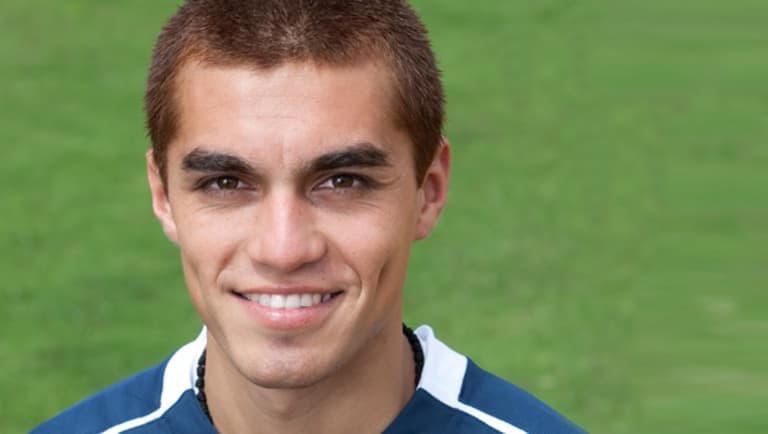When Hector Jimenez was rising through the ranks of youth soccer in Southern California, he knew he had a chance to play professionally by the time he was a teenager. He was receiving interest from big-name clubs based hours away, getting free cleats and being courted by professional scouts.
The only person who could stop him on the field, it seemed, was his coach.
“He wouldn’t let me score,” Hector recalls during a recent conversation.
In those games, Hector’s team could score 20 goals. But that wasn’t what his coach was interested in.
“It was more about: Assist people!” Hector says. “[My coach] would say, ‘I’d rather have you get 10 assists than score 10 goals. Help the people around you.’”
The coach remembers those games, too, and his advice to Hector.
“You won’t gain anything from scoring 20-0,” he says. “In those games I would play the defenders as forwards and forwards as defenders. If I didn’t stop [Hector] from scoring, he would have scored many goals. But he would have learned nothing. I used to tell him, ‘Find a way to open up the ball, play some diagonals, do whatever, but don’t score.’
"He would look over from the sidelines and say, ‘Dad! Can I score now?'”
---
---
Mauricio Jimenez and his wife, Delilah, came to the United States separately from Mexico in their teenage years. Mauricio arrived through the services of a coyote, one of the human traffickers who take people across the border for a fee. Delilah came in the back of a truck. It was a dangerous endeavor.
“When I do ask [my parents] about it, it’s crazy,” Hector says. “Sometimes you’d pay the coyotes money and they would just disappear. They’d leave you out there stranded. So my parents were just lucky to know good people.”
Years later, the pair met and started a family in Bell Gardens, California, on the southwestern side of Los Angeles. As Hector put it, sometimes it was hard to stay out of trouble in Bell Gardens.
“There’s a lot of gangbanging going on,” he says. “There are gangs around school. It’s very easy to get sucked into that kind of stuff. I had friends who were involved with stuff like that. You just try and stay away from it, but a lot of the guys I went to school with got sucked in."
But Hector stayed out of it, largely because his parenst were strict and demanded good grades. Mauricio set up a system for his son, who started excelling at soccer at an early age: Keep up your grades and behave, or you won’t have a ride to practice.
“I said, ‘If you do good here, I’ll be there for you every time,’” Mauricio says. “’If you do good in school, if you do good here in the house with your two sisters and there are no problems and your mom tells me you don’t have fights with your sister, I’ll support you all over.’”
And it wouldn’t be long before Hector would require “all-over” support. His first major youth club team, Arsenal FC, played nearly two hours away from Bell Gardens, trips that Mauricio would make after a full day of work building electric transformers.
But Mauricio had plenty of experience playing and refereeing soccer as well. Without the overwhelming support, he said, he knew Hector wouldn’t be able to make it. So he promised to make the hard trips as long as Hector stayed on the straight and narrow.
“I knew a lot of kids that played very well, but their behavior wasn’t the best and their support wasn’t the best in their houses,” Mauricio says. “I learned a lot from that, seeing what others do not do. From the bottom of my heart, I feel bad for many kids who played great soccer and couldn’t make it because it was easy for them to engage doing other things.”

“I had rules in the house," Hector recalls. "You go to school and you come back; there’s nothing else you do. You get good grades, and by you getting good grades I’ll reward you with driving you.' Now that I'm older I realize that a two-hour drive isn’t easy, and that’s after eight hours of work that he put in.”
Soccer quickly became more than just a love for Hector. The two-hour drive to play was also a journey into a different life, far away from the gangs and roughness of Bell Gardens. He began to make real friends there and realize what it would take to get to the next level.
“Hanging out with them, I was like, ‘Damn, this is cool. I’d rather play soccer here,’” Hector says. “The lives they lived, the lifestyles they had – that was what I wanted to do. They were more focused. Half of the guys that I played club soccer with either went to Stanford or Cal.”
On the field, Hector quickly made a name for himself. All that coaching from Mauricio -- and demanding that he not score -- had helped Hector become a force on the field and one of the best midfielders in the country. His talent was eventually noticed by national scouts and he was invited to the U.S. Soccer U-17 residency program in Bradenton, Florida.
Mauricio almost didn’t let him go. He struggled with the thought of his 16-year-old son living on the other side of the country, by himself, without his father there to support him. But he realized what it would mean -- both to Hector and to himself.
“When we came from our country, we all dreamed of a better life for ourselves,” Mauricio says. “I got married here with my wife and started dreaming of something different than I had. And the thing that sometimes keeps you out of having something is your parents’ support.
“It’s harder to not have someone to take you to practice, giving you motivation and pushing you and making deals with you so that you keep on working and focus. For me, to find out that he made it to the national team at the age of 16 was something that feels nice in your heart.”
Looking back, Hector says, it was a culmination of everything that Mauricio and Delilah had built. Their son, born of two parents who came to the country to find a better life (and would eventually become citizens), had an American flag next to his name.
“I can’t imagine getting up and just saying, ‘I’m going to start a different life in a different country,’” Hector says. “But at the end of the day, they wanted something better not just for them, but for us. It paid off.”
---

After a year at the Bradenton academy, Hector returned to California. He was recruited heavily by several top college soccer programs and in 2007, became the first boy in Bell Gardens High School’s history to earn a division-one sports scholarship when he signed to go to the University of California-Berkeley.
Hector was also the first of his family to go to college. Since then, his two younger sisters, an uncle and several cousins have all gone to college.
“We didn’t have that in our past,” Mauricio says. “Now we have this. And it’s excellent because the next generation will have even better chances in our family.”
Four successful years at Cal, Hector was drafted by the LA Galaxy in 2011. He joined a team that included world-class stars like David Beckham and Landon Donovan, and he helped the club win two MLS Cup trophies, in 2011 and 2012. Those titles afforded Jimenez a trip to the White House in the traditional meeting with the president of the United States.
“It’s crazy to think that I’ve met the president twice,” he says, smiling. “It’s crazy to think for my dad, ‘I was an immigrant to this country and my son met the president.’”
---
Now with Columbus Crew SC, Jimenez has carved out a niche as a playmaking right back in coach Gregg Berhalter’s fullback-heavy attack. He’s near the top in all of MLS in chances created per 90 minutes this season.
In a way, Hector still plays like he’s not allowed to score, and he says he has his father to thank for that.
“I love assisting more than scoring goals nowadays," he says. "I don’t score many goals. I’d rather be the setup. As a young player he got that in my head.”
Mauricio watches from afar, proud of what Hector has become.
“[Hector] is a team player, and he’s always going to be ready for whatever position he’s requested to play,” he says. “He always has a way to dribble and look at who has the best chance to score, and he’ll put it there.”
But Mauricio isn’t just happy with Hector’s playing career. He says his son was a good boy who has become a good man, though he wishes he could see him more.
“It was great to live with him in the time I lived with him; it was a short time for me,” Mauricio says. “He moved to Florida and then he went to Berkeley. After that he was grown up. I didn’t have as much time that I would have loved to share with him as a normal father. … But he’s always in touch. What he’s done for himself, it’s what any father would feel proud of.”
Hector texts his dad every day. And on particularly tough days, he says they still lean on each other.
“There are days when I’m having a bad day or he’s having a bad day and it’s just a simple text like, ‘Get up. Go to work,’” Hector says. “We’re living, we’re breathing, you can’t complain.”
And, ever the coach, Mauricio still finds time to critique his professional soccer-playing son’s game.
“To this day, he’ll be like, ‘You had a good game, but…’ which I love,” Hector says. “I can talk to him about soccer for hours.”
And while Mauricio’s instructions might be drowned out by MLS crowds these days, it’s not because he’s not giving them.
“He’s got this whistle that was very annoying; you could hear it all over the field,” Hector says, laughing. “He would use it with me. If I was doing something wrong, I’d hear it and be like, ‘Where is he?’
“At one point I was in LA and I said, ‘You’ve come a long way from whistling.’ And he just said, ‘Yeah, because you can’t hear me.’”













